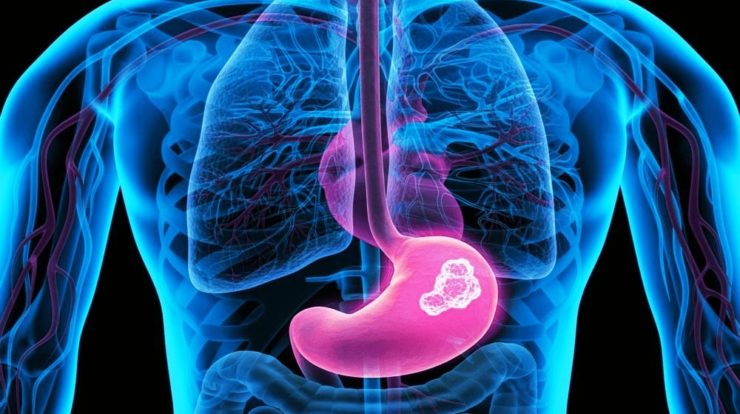
Gastric Cancer, also known as Stomach Cancer, is the sixth most common cancer in the world with nearly 1 million new cases every year. The aggressiveness of the disease is discerned by the fact that it is the third most common cause of cancer deaths globally causing 0.7 million deaths annually. In India, the Representative Survey of Cancer Mortality indicates that gastric carcinoma is the second most common cause of cancer-related deaths amongst men and women in the country.
What is Gastric Cancer?
Gastric cancer occurs when cells in the lining of the stomach grow uncontrollably and form tumors that can invade normal tissues and spread to other parts of the body.
The wall of the stomach is made up of 5 layers of tissue. The layers of the stomach wall are Mucosa, Submucosa, Muscle, Subserosa, and Serosa. Gastric cancer begins in the Mucosa (innermost layer of the stomach wall) and spreads through the outer layers as it grows.
Stomach cancers can spread or metastasize, in different ways. They can spread to lymph nodes or grow through the walls of the stomach or travel through the bloodstream and form metastasis in other organs of the body.
Types of Gastric Cancer
1. Adenocarcinoma: The most common type of stomach cancer, Adenocarcinoma, originates in the cells that form the innermost layer of the stomach in the mucus-producing cells, called the Mucosa, and is responsible for about 90 percent of all cases of stomach cancer.
2. Lymphoma: Cancers of the immune system tissue located in the stomach.
3. Gastrointestinal Stromal Tumors (GIST): Starting in very early forms of cells in the wall of the stomach called interstitial cells of Cajal (ICCs), these tumors can be benign or malignant.
4. Carcinoid Tumors: A rare, slow-growing type of cancer that originates in the cells of the nervous system and endocrine system. Carcinoid Tumors do not spread to other organs and account for about 3 percent of gastric cancer incidence.
Symptoms of Gastric Cancer
According to the National Cancer Institute, USA, there are typically no early signs of cancer. However, as it exhibits some telltale signs as it grows and spreads in the early stages.
Symptoms include:
- Indigestion and stomach discomfort
- Constant bloating
- Mild nausea
- Loss of appetite
- Heartburn
- Unexplained weight loss
- Abdominal pain or vague pain just above the belly button area
- Early satiety
- Weakness or fatigue
- Blood in vomit or stool
Keep Cancer at Bay with Ayurveda
Ayurveda stimulates the self-healing ability of the body and has a wide range of therapies and herbs to purify and support body tissues for natural recovery. The starting point is balancing the Tridosha and Triguna. Ayurveda can determine subtle disturbances at a very early stage of the disease, thus opening doors to care and treatment.
Ayurvedic Herbs that Work Wonders in Gastric Cancer Treatment
Ayurvedic treatment focuses on reducing the cancer cell size, shrinking the tumor mass, and preventing further spread of cancer to other tissues or organs.
The below mentioned Ayurvedic Herbs work as an excellent remedy for Stomach Cancer.
Garlic (Allium sativum)
Garlic is one of the most powerful anti-cancer herbs. The Organosulfur compound found in Garlic inhibits the growth of the cancer cells in the inner lining of the stomach.
Mulethi (Glycyrrhiza glabra)
Popularly known as Liquorice, the roots of the herb are extremely beneficial for maintaining gastrointestinal health. The root extract also shows antitumor activity and thus is believed to prevent the growth of cancer.
Bhunimb (Andrographis paniculata)
Commonly known as the ‘King of Bitters’, Bhunimb is a herbaceous plant. It inhibits the multiplication of the cancer cells and is thus highly effective in fighting cancer.
Turmeric
Ayurveda has been using Turmeric for medicinal purposes for ages. Curcumin, present in Turmeric is a powerful cancer-fighting bioactive component that prevents the growth of stomach cancer cells.
Tulsi (Holy Basil/ Ocimum sanctum)
The fresh leaf of the Ocimum sanctum enhances immunity. Abundant quantities of Eugenol, an anti-cancer component, present in the herb enable its use as a cure for cancer.
Ayurveda is often called ‘The Mother of Healing Science’. The 5000-year old Indian system of natural and holistic medicine emphasizes prevention and lays the foundation for a healthy lifestyle by strengthening the body’s natural defense system. Consult an expert today and take a step towards leading a cancer-free life with Ayurveda.
